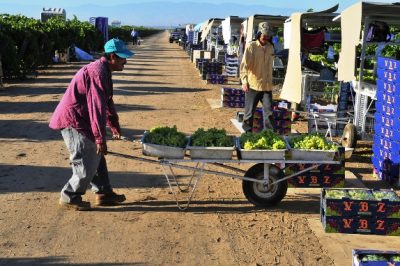Business and the Workforce
Immigrants not only bring diverse skills and perspectives to the U.S. workforce, they often fill employment gaps in crucial fields. We advocate for expanded work visas and related programs so our labor force can continue to benefit from immigrant workers and remain competitive in the global economy

Report: Not Coming To America
Our new report, “Not Coming to America: Why the US is Falling Behind in the Global Race for Talent” is a first-ever comparative study of the immigration reforms other countries employ to boost their economies and lure the high and low-skilled workers needed for continued economic growth. The report… Read More

Immigrant Workers in the U.S. Labor Force
The Brookings Institution and New American Economy published “Immigrant Workers in the U.S. Labor Force,” a study analyzing the differences in both the occupations and education levels of immigrant and native-born workers in the American economy and found that even when working the same sectors, immigrants and native-born gravitate… Read More

The Politics of Skill: Rethinking the Value of “Low-Skilled” Immigrant Workers
The political discourse surrounding the incorporation of immigrants into the U.S. labor market tends to sort immigrant workers into two broad and mutually exclusive categories: high-skilled workers who are valued by many for their contribution to economic growth, and low-skilled workers who are viewed by some as causing a glut in the U.S. labor market and thereby displacing low and middle-income native-born workers. For the most part, these categories are structured around formal education. Workers possessing a level of formal education equal or superior to the median in the United States are on one side of this divide, while workers with less formal education than that threshold are on the other. Most current proposals favor expanding immigration opportunities for those immigrants with high levels of formal education. Read More

Always in Demand: The Economic Contributions of Immigrant Scientists and Engineers
With the U.S. economy in the midst of a prolonged slump, it’s hard to believe that any industry would actually benefit from having more workers. But that is precisely the case when it comes to those industries which depend upon highly skilled scientists and engineers. The United States has long faced a dilemma in this respect: the U.S. economy is capable of absorbing more high-tech professionals than the U.S. educational system produces. That is one reason so many U.S. scientists and engineers are immigrants. In “STEM” occupations (science, technology, engineering, and mathematics), the foreign-born account for 26.1 percent of workers with PhDs and 17.7 percent of those with master’s degrees. Even more U.S. scientists and engineers would be immigrants if not for the arbitrary limits imposed by the U.S. immigration system, particularly the inadequate supply of green cards and H-1B visas. Given that STEM professionals tend to create jobs through their innovative work, such limits are economically self-defeating. Immigrant scientists and engineers create new jobs. Read More

Immigrant Entrepreneurs: Creating Jobs and Strengthening the Economy
There is widespread agreement across a number of key economic planning groups that immigrant entrepreneurs create jobs and strengthen the economy. Yet, the U.S. immigration system often forces out immigrant entrepreneurs, driving them to other countries that are competing for international talent. Although many people recognize the giants of immigrant entrepreneurship, such as Sergey Brin of Google and Pierre Omidyar of eBay, thousands of other science and technology businesses are quietly making a difference by creating almost half a million jobs for Americans and generating revenue of more than $50 billion. The depth and breadth of immigrant entrepreneurs extend across the spectrum of enterprises, including neighborhood, growth, and transnational businesses. Expansion of employment-based visas would allow companies’ access to high-potential foreign individuals who are graduates of U.S. universities. Businesses, cities, and states across the country should support changes in visa policy and work to develop partnerships with immigrant entrepreneurs to create jobs and strengthen the economy. The report features profiles of immigrant entrepreneurs and shines a light on some of the difficulties they face. Current immigration laws make it difficult for many immigrant entrepreneurs to contribute to the nation’s growth. The report contains administrative and legislative proposals that taken together could create an atmosphere that fosters growth. Read More

Our American Immigrant Entrepreneurs: The Women
When Americans picture an immigrant entrepreneur, they likely imagine a man who began the migration of his family, later bringing his wife over to become a volunteer assistant in the shop. This image is straying farther and farther from reality as more women open their own enterprises. Yet the idea that immigrant women might be the owners and originators of some of our restaurants, motels, Silicon Valley hi-tech firms, local real-estate agencies, or other entrepreneurial ventures has yet to become conventional wisdom. Today, immigrant women entrepreneurs abound in every region of the United States. In 2010 for example, 40 percent of all immigrant business owners were women (1,451,091 immigrant men and 980,575 immigrant women). That same year, 20 percent of all women business owners were foreign-born. These numbers indicate that there is a quiet revolution of immigrant women’s business ownership that is organically growing, but is going relatively unnoticed in the culture at large. In this report, we asked women from a range of business sectors in several cities to tell us why and how they started their ventures, what challenges they faced, what their businesses mean to them, and what contributions they are making. Read More

Lamar Smith Introduces New Agricultural Twist to His Anti-Immigrant Agenda
Rep. Lamar Smith (R-TX), Chairman of the House Judiciary Committee, has added a novel new twist to his anti-immigrant agenda: letting more immigrant workers into the country. In defiance of logic, the man who believes that immigrants merely steal jobs from U.S. citizens now wants to import migrant agricultural workers. At a hearing today of the House Subcommittee on Immigration Policy and Enforcement, Rep. Smith rolled out his latest legislative proposal, called the “American Specialty Agriculture Act” (H.R. 2847). The bill would create a new “H-2C” visa for temporary agricultural workers to replace the existing H-2A program, and would allow growers to bring in up to 500,000 of these workers each year. Read More

Press Release: New Report from the Partnership Finds That More Than 40 Percent of Fortune 500 Companies Were Founded by Immigrants or Their Children
Partnership Co-Chair Michael Bloomberg Discusses Need for Immediate Passage of Immigration Reforms to Fuel Economic Growth and Create Jobs at Council on Foreign Relations The Partnership for a New American Economy today announced the release of “The ‘New American’ Fortune 500,” a new report that finds that more… Read More

Immigrants in America: More Skilled and Educated Than Ever Before
Washington D.C. – Today, the Brookings Institution released a new report, The Geography of Immigrant Skills: Educational Profiles of Metropolitan Areas, which finds that more working-age immigrants hold college degrees than lack high-school diplomas. This newly-released data has broad implications for an immigration debate that is driven largely by… Read More

Federal Court Decision Protects H-1B Employees from Wrongful Arrest
Washington D.C. – A recent ruling from a federal judge in Connecticut confirmed that—as the American Immigration Council (AIC) and the American Immigration Lawyers Association (AILA) argued in an amicus brief—the government may not arrest H-1B employees for whom timely-filed extension applications remain pending. The decision in… Read More
Make a contribution
Make a direct impact on the lives of immigrants.
